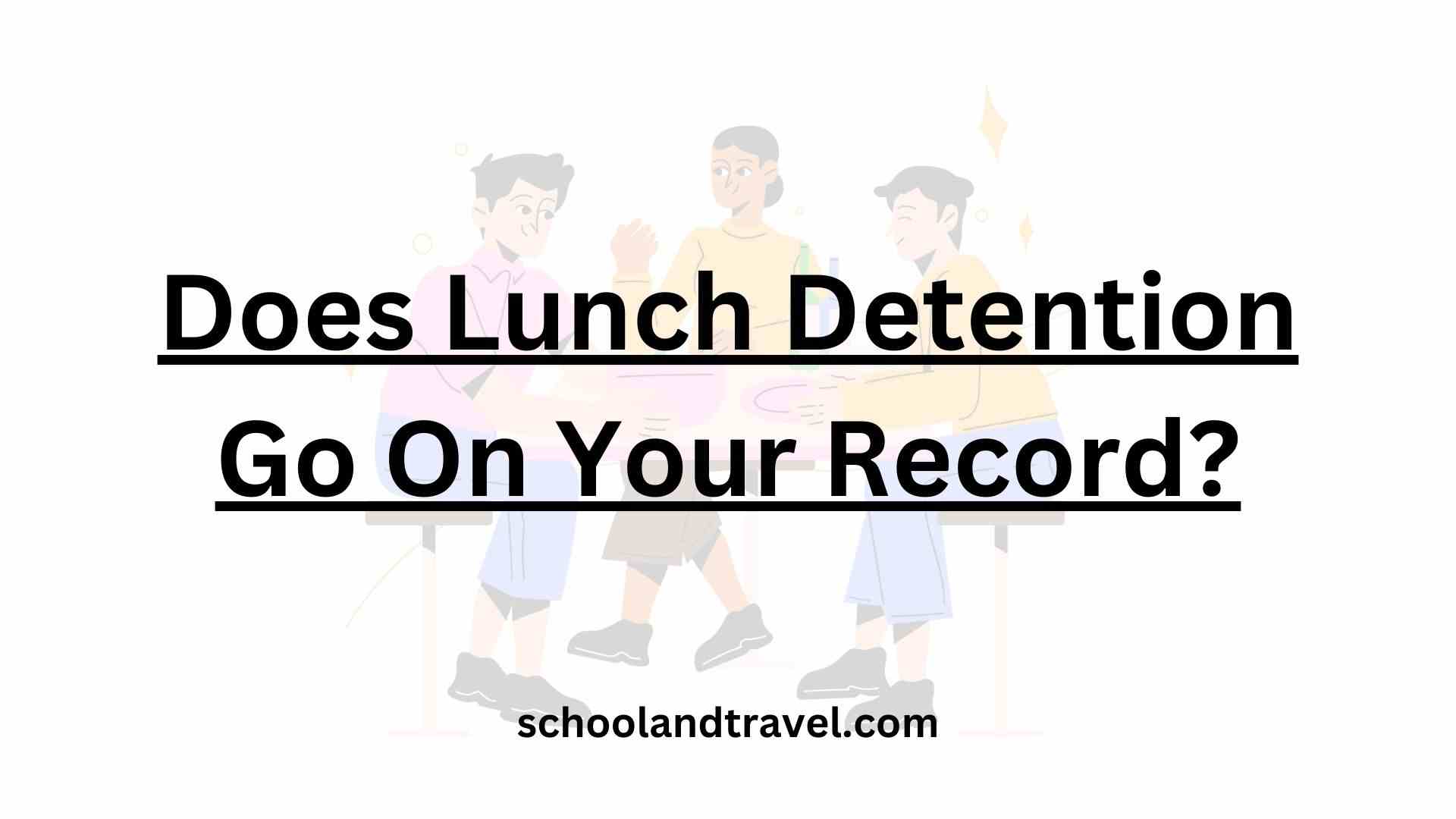Lunch detention is a joint disciplinary action in schools, where students must stay during lunchtime due to their behavior.
However, many students and parents are curious whether lunch detention goes on a student’s record.
This article aims to shed light on this topic and clarify the implications of lunch detention.
By understanding the role of lunch detention and its impact on a student’s academic record, we can address the concerns and misconceptions surrounding this disciplinary measure.
What Does Lunch Detention Mean?
Lunch detention is a disciplinary measure commonly employed by schools to address inappropriate behavior or violations of school rules during lunchtime.
It involves requiring the student to remain in a designated area, such as a classroom or designated lunch space, during the lunch break instead of socializing or engaging in regular lunch activities.
The purpose of lunch detention extends beyond punishment; it aims to provide a structured opportunity for reflection, behavior modification, and character development.
During lunch detention, students are expected to use the time productively, such as completing academic assignments, reflecting on their actions, or engaging in activities that promote personal growth and responsibility.
The specific expectations and activities may vary depending on the school’s policies and the nature of the student’s misconduct.
The duration of lunch detention can also vary, ranging from a single lunch period to multiple days, depending on the severity of the behavior.
The underlying objective of lunch detention is to help students understand the consequences of their actions, encourage self-reflection, and promote accountability for their behavior.
Lunch detention allows students to learn from their mistakes, develop problem-solving skills, and make positive choices moving forward by providing a structured environment for introspection and redirection.
Relationship Between Lunch Detention and Academic Records
In most cases, lunch detention does not directly impact a student’s academic records.
Academic records typically contain information about a student’s academic performance, such as grades, attendance, and academic disciplinary actions, such as suspensions or expulsions.
Lunch detention, a minor disciplinary consequence, is usually not included in a student’s official academic records.
It is considered a non-academic disciplinary measure focusing on behavior management rather than academic assessment.
The purpose of lunch detention is to address misconduct during lunchtime and provide an opportunity for reflection and improvement.
However, it’s important to note that repeated or severe disciplinary actions, including lunch detention, can still indirectly affect a student’s academic standing.
Excessive or ongoing behavioral issues may lead to additional disciplinary measures or interventions that could impact a student’s academic progress.
School administrators and educators may monitor patterns of misconduct and take appropriate actions to ensure a safe and conducive learning environment.
It is always advisable for students to take lunch detention seriously and use it as an opportunity to reflect on their behavior, make positive changes, and avoid further disciplinary consequences.
While it may not directly impact academic records, maintaining good conduct and demonstrating responsible behavior contribute to a positive school experience and personal growth.
Impact on Behavior and Character Development On School Records:
Lunch detention can significantly impact a student’s behavior and character development, even if they don’t put it on record.
This section will explore how lunch detention can shape students’ attitudes, actions, and personal growth.
1. Reinforcement of Consequences
Lunch detention is a tangible consequence for inappropriate behavior, reinforcing that actions have repercussions.
Students who experience lunch detention may become more conscious of the potential consequences of their actions and develop a greater sense of responsibility.
2. Reflection and Self-Evaluation
The time spent in lunch detention provides an opportunity for students to reflect on their behavior and evaluate the choices they have made.
This introspection can lead to increased self-awareness and a deeper understanding of their behavior’s impact on themselves and others.
3. Development of Self-Discipline
Going through lunch detention can foster the development of self-discipline as students learn to control their impulses and make better choices in the future.
By experiencing the consequences of their actions, students may become more motivated to avoid similar situations and exercise self-restraint.
4. Improved Decision-Making Skills
The lunch detention experience can catalyze students to reevaluate their decision-making processes.
They may learn to consider the potential consequences of their choices more carefully, leading to improved decision-making skills in various aspects of their lives.
5. Growth in Empathy and Respect
Students who have experienced lunch detention may develop greater empathy and respect for others who have faced similar consequences.
They may understand how their actions can impact those around them and become more considerate.
It is important to note that lunch detention alone may not completely transform a student’s behavior or character.
However, when combined with other supportive measures such as counseling, mentorship, and positive reinforcement, lunch detention can contribute to a student’s growth and development.
Frequently Asked Questions: Does Lunch Detention Go On Your Record?
Lunch detention is typically not recorded on a student’s permanent school record, primarily focusing on academic achievements, grades, and other relevant academic information. However, it is essential to note that disciplinary actions and behaviors that persist or escalate may be documented in a student’s disciplinary record, which could have potential implications for future disciplinary actions or interventions.
Generally, lunch detention is unlikely to impact college applications significantly. College admissions committees primarily focus on academic performance, standardized test scores, extracurricular activities, and personal achievements. However, repeated or more severe disciplinary actions documented in a student’s disciplinary record may raise concerns about character or behavior, which could be considered in the holistic review process.
Lunch detention only sometimes impacts a student’s GPA or academic standing. GPA calculations are primarily based on academic coursework, assignments, and assessments. However, if lunch detention is part of a larger pattern of disruptive behavior that affects classroom participation or academic progress, it could indirectly impact academic standing.
Lunch detention is often considered a minor disciplinary consequence. However, suppose a student continues to engage in misconduct or exhibits more serious behavioral issues.
It is essential to take lunch detention seriously and use it as an opportunity for self-reflection and behavior improvement. Show respect to the supervising teacher and follow any guidelines or expectations set during the detention period.
Conclusion
While it serves as a disciplinary consequence for inappropriate behavior, lunch detention is generally considered a minor infraction and is separate from a student’s permanent academic record.
It is essential to recognize the purpose of lunch detention as a tool for behavior management and character development rather than a permanent mark on a student’s educational journey.
Lunch detention can contribute to a student’s personal growth by fostering accountability, self-reflection, positive decision-making and help create a supportive school environment.
Awesome one; I hope this article answers your question.
Editor’s Recommendations:
- 7+ Cheapest Online Schools in The World (FAQs)
- 11+ Online Schools that give Laptops & Refund Checks
- How to start an Online School (Steps, formats)
- 5 Easiest Traffic Schools Online in California (FAQs)
- The Role of Accreditation in Online High Schools
- 5 Best Extracurricular Activities For Ivy League (FAQs)
- 7+ Easiest Ivy League To Get Into (Worth, FAQs)
- Are There Ivy League Schools In California? (FAQs)
- 5 Best Ivy League Universities In Canada (Req., FAQs)
- How To Get Into Oxford as an American (Req., FAQs)
- Can You Get Rejected From Community College? (FAQs)
- Is Swarthmore College an Ivy League School? (FAQs)
- Is Purdue University an Ivy League School? (FAQs)
- Is Rice University An Ivy League School? (Simi, Diff, FAQs)
If you find this article good, please share it with a friend.






